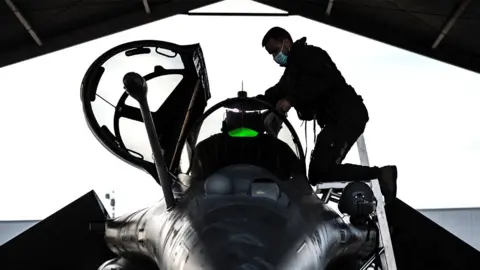Ukraine: Calls for no-fly zone rejected by defence secretary
 Getty Images
Getty ImagesCalls for a no-fly zone to be imposed by Nato forces over Ukraine have been rejected by the UK's defence secretary.
Ben Wallace reiterated warnings that this would likely trigger a Europe-wide conflict with a nuclear-armed power.
Ukraine leaders have appealed to the West to set up a no-fly zone but their calls have been repeatedly rebuffed.
Meanwhile, Boris Johnson and Ukrainian President Volodymyr Zelensky have agreed sanctions must go further to exert maximum pressure on Russia.
The UK has partnered with Western allies to enact sweeping sanctions on Russia, including against Russian banks, businesses and people.
In a call, the UK prime minister told Mr Zelensky the UK was "rallying" the UN General Assembly to "ensure the strongest possible condemnation" of Russia and its president, Vladimir Putin, at a meeting of the body in New York later on Wednesday, a Downing Street spokeswoman said.
A week in to Russia's invasion of Ukraine, attacks on key cities have intensified with fighting raging in the north, east and south.
A no-fly zone over Ukraine would mean that military forces - specifically Nato forces - would have to engage directly with any Russian planes spotted in those skies and shoot at them if necessary.
In a BBC interview, Ukrainian scientist Glib Mazepa, from the north-eastern city Kharkiv where heavy fighting is reportedly taking place, urged Nato to "close the skies over Ukraine to Russian missiles, to Russian planes" to protect civilians.
"Otherwise they will just bomb the whole city to ashes," he said.
However, Mr Wallace told the BBC's Today programme a no-fly zone would need to be enforced by Western air forces and inevitably lead to combat with Russian jets to prevent them from operating.
He added a no-fly zone would be a tactical benefit to the Russian invading forces, as Ukrainian jets would also not be able to operate.
"If you had a no-fly zone in Ukraine, the overwhelming scale of the Russian army would be able to drive around with impunity, which it can't at the moment," he said.
Mr Wallace added that most of the Russian strikes on Ukraine were primarily being carried out by missiles and shelling by heavy artillery, neither of which would be impacted by a no-fly zone.
Laying out the ways of setting up a no-fly zone, Mr Wallace added it would require enforcement by Nato jets, which would inevitably lead for the need to shoot down Russian planes in active combat.
He also reiterated warnings that have been issued by many Western politicians and military experts that a no-fly zone would risk a major escalation of the conflict.
Mr Wallace added another way of achieving a no-fly zone was arming Ukrainians with anti-air capabilities - a policy Britain has "led the way" in.
He said this was an effective means of reducing Russian air operations as it prevented them from operating in the day.
There have been increasing calls for the enforcement of a no-fly zone to limit Russian bombing in recent days.
On Tuesday, Prime Minister Boris Johnson was confronted by a Ukrainian woman who demanded Western nations enforce one over the country to protect civilians. Mr Johnson replied saying "direct combat" with Russia was not something the UK could do as it would be "truly very difficult".
However, senior Conservative Tobias Ellwood, chair of the defence select committee, argued that Nato should introduce a "humanitarian partial or total" no-fly zone.
"What scale of war crimes, what numbers of civilian deaths must we witness - before Nato, the most powerful military alliance in the world, is tasked to intervene?" he tweeted.

Russia attacks Ukraine: More coverage
- LIVE: Latest updates from on the ground
- THE BASICS: Why is Putin invading Ukraine?
- RUSSIA: Watching the war on TV
- UKRAINE: 'I have never felt so much love for my homeland'
- IN DEPTH: Full coverage of the conflict

Echoing Mr Wallace's comments, a former deputy supreme allied commander, said Nato cannot impose a no-fly zone as this could lead to a "third world war".
General Sir Adrian Bradshaw told the BBC's Today programme the conflict was not like the 2003 invasion of Iraq. "We're up against a sophisticated enemy with very capable air defence assets," he said.
"This becomes a struggle between the forces of Nato and the forces of Russia, on the ground, quite probably from the sea, in the air, in the space domain, in the information domain and in the cyber domain.
"This is war. It amounts to 30 countries against Russia. This is the third world war in anybody's language. We cannot afford to let that happen."
